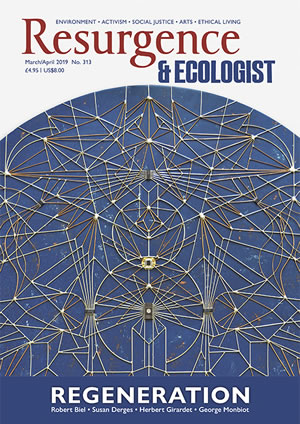Lichen speckled grey-green on an old building or tree looks like a plant but is algae living in perfect cooperation with fungi. From coral reefs to the bacteria in our gut, these symbiotic relationships, where different organisms live together for mutual benefit, are everywhere in Nature. A new documentary, Symbiotic Earth, explores this view of life through the ideas of the pioneering American scientist Lynn Margulis. This ambitious film is an insight into an extraordinary woman who allowed us to see ourselves and our relationship with the natural world in a new light.
We are led by film-maker John Feldman’s narration on his journey to tell the story of Margulis’s “scientific revolution”, after her unexpected death in 2011. It is a broad-ranging crash course in new biological thinking. We see and hear from scientists and thinkers around the world, among them James Lovelock, Fritjof Capra and Stephan Harding, who will be familiar to readers of Resurgence & Ecologist. Margulis is the real star. She dazzles on screen. Her mischievous intensity, direct language, and desire to communicate are almost hypnotic. “She liked to start trouble,” says Dorian Sagan, Margulis’s son by her first husband, the renowned astronomer Carl Sagan, “but it wasn’t trouble without a purpose.”
We see her in intellectual combat with the dominant ‘neo-Darwinian’ view of life associated with Selfish Gene author Richard Dawkins. Dawkins’ ideas of evolution, Margulis says, are simply wrong and “took the life out of biology”. Her determination is stunning. She always fought conventional wisdom, and often won. We learn how her theory that all plant and animal cells evolved from the merger of free-floating bacteria was ridiculed when she first proposed it in the 1960s, only to be proved later by DNA evidence. In the early 1970s, she met Lovelock and helped him formulate the Gaia theory that all life on Earth is an integrated living system. The intellectual love-in between these two scientific rebels is one of the joys of the film.
Its only real weakness is its length. Divided into ten ‘essays’, making it feel at times like an Open University course, the film lasts for two hours and forty minutes, which will most likely reduce its appeal to a mass audience new to the subject. However, for those interested in alternatives to the idea that the dominant trait of Nature is brutally selfish competition, the film is a treat, and Margulis does not hold back from drawing broader lessons for society based on her biology.
Symbiosis is the way of the world, Margulis tells us, and can help tackle the challenges of the 21st century. I was intrigued by the thought that our mistaken ideas about selfish competition in Nature are mirrored in our global economic system. What kind of economy could we build on the basis of a more symbiotic, cooperative view of life? I also enjoyed the film’s strong environmental theme. In Margulis’s view, thanks to all the microbes that help our bodies work it may be more accurate to think of ourselves as ecosystems rather than individuals. We are inextricably woven into the web of life. She says at one point, in a message that deserves to be stamped on rubbish bins everywhere: “You can never throw anything out: it goes around.”
The film deserves a wide audience. Watch it, and you may never see lichen, or yourself, in the same way again.
Symbiotic Earth is available on Vimeo On Demand. Further screening information is at www.hummingbirdfilms.com/symbioticearth/screenings







